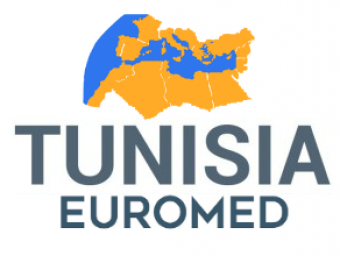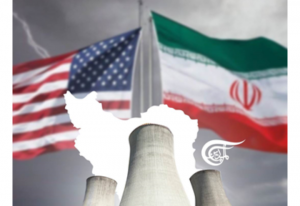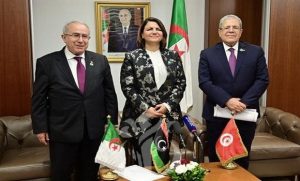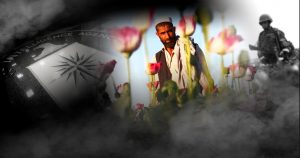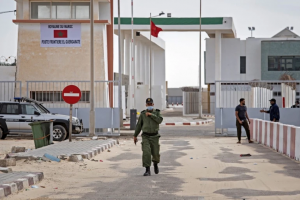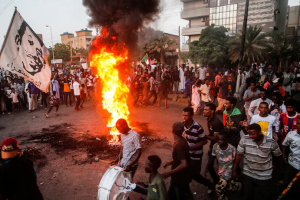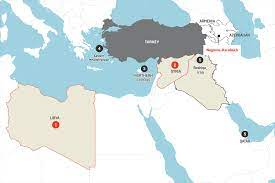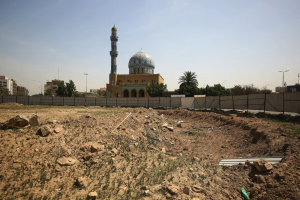European Parliament resolution on the situation in Tunisia
(2021/2903(RSP))
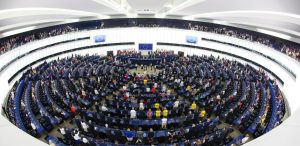
The European Parliament,
– having regard to its previous resolutions on Tunisia and its resolution of 25 February 2016 on the opening of negotiations for an EU-Tunisia Free Trade Agreement[1],
– having regard to the final report of the EU Election Observation Mission to the presidential and parliamentary elections in Tunisia held on 15 September and 6 October 2019,
– having regard to the Association Agreement between the European Union and Tunisia, and to the various thematic meetings held under its framework in 2019 and 2020,
– having regard to the International Monetary Fund (IMF) Executive Board Conclusions of 26 February 2021 under the Article IV Consultation with Tunisia,
– having regard to the Joint Communiqué on EU-Tunisia relations of 4 June 2021: ‘For a renewed partnership’,
– having regard to Tunisian Presidential Decree No. 2021-69 of 26 July 2021 terminating the functions of the Head of Government and members of the Government, Tunisian Presidential Decree No. 2021-80 of 29 July 2021 relating to the suspension of the powers of the Assembly of People’s Representatives, Tunisian Presidential Decree No. 2021-109 of 24 August 2021 relating to the extension of exceptional measures relating to the suspension of the powers of the Assembly of People’s Representatives, and Tunisian Presidential Decree No. 2021-117 of 22 September 2021 relating to exceptional measures,
– having regard to the declaration by the Vice-President of the Commission / High Representative of the Union for Foreign Affairs and Security Policy (VP/HR) on behalf of the European Union of 27 July 2021 and his statements to the press in Tunis on 10 September 2021,
– having regard to the Constitution of Tunisia of 2014,
– having regard to the International Covenant on Civil and Political Rights, to which Tunisia is a party,
– having regard to the Convention on the Elimination of All Forms of Discrimination against Women (CEDAW), which Tunisia ratified in 1985 and to which it withdrew its reservations in 2014,
– having regard to the National Action Plan (NAP) on Women, Peace and Security 2018-2022, adopted in 2018,
– having regard to Rule 132(2) and (4) of its Rules of Procedure,
A. whereas Tunisia is a privileged partner of the EU, and continuous support and backing has been a priority, with election observation missions in 2011, 2014, 2018, and 2019 confirming the EU’s unwavering commitment to democracy in Tunisia; whereas this year’s 10th anniversary of the Tunisian Revolution marks an important moment in Tunisia’s democratic development;
B. whereas the socio-economic situation has been characterised by widespread economic stagnation, related to internal political context, and a sanitary crisis with the world’s second highest rate of COVID-19 deaths; whereas the COVID-19 pandemic, the lack of tourism, high levels of youth unemployment and inflation have exacerbated Tunisia’s fragile economy; whereas endemic corruption, incomplete transitional justice and serious economic and security challenges remain substantial obstacles to Tunisia’s full democratic consolidation;
C. whereas, in this context, on 25 July 2021 the President, Kais Saied, invoked Article 80 of the Tunisian Constitution, which empowers him to enact exceptional measures in order to deal with an imminent danger to the state, and announced the dismissal of Prime Minister Hichem Mechichi, the suspension of the Assembly of People’s Representatives (ARP) for an extendable period of 30 days and the lifting of the parliamentary immunity of all its Members; whereas on 24 August, 2021, the President extended the suspension of Parliament;
D. whereas the governments of the UAE, Saudi Arabia and Egypt immediately praised and expressed rhetorical support for President Saied’s initiative;
E. whereas the absence of Constitutional Court formation, and the resulting inability for Members of Parliament to appeal against any unilateral extension of the emergency situation by the President, as established in the relevant article of the Constitution, gave rise to serious concerns about the Tunisian democratic transition and fundamental rights in the country;
F. whereas on 22 September 2021, the President issued Presidential Decree No 2021-117, which contains provisions affirming self-supremacy and the primacy of the decree over the Constitution, thereby undermining the Constitution, and concentrates all the powers of the State in the person of President Kais Saied; whereas the Constitution’s provisions on rights and freedoms will only be respected and guaranteed when they do not contravene laws based on presidential decree-laws and exceptional measures; whereas Presidential Decree 117 does not allow any presidential decision to be appealed in a court of law, including before Tunisia’s highest Administrative Court and its Court of Cassation;
G. whereas this concentration of powers has been vested in the President’s hands without any time limit; whereas the President granted himself full legislative power to modify by decree the laws governing political parties, elections, the judiciary system, unions and associations, freedom of the press and freedom of information, the organisation of the justice department, human rights and freedoms, the Code of Personal Status, internal security forces, customs and state budget;
H. whereas although Tunisian civil society has publicly expressed its serious concerns about new restrictions, President Kais Saied’s July measures did enjoy significant public support, which shows the public discontent with the serious socio-economic situation and severe governmental dysfunction the country is facing; whereas 18 local and international NGOs have issued a joint declaration warning about the situation of democracy in Tunisia; whereas the G7 has called on Tunisia to return to a constitutional order and for parliamentary activities to be resumed;
I. whereas on 26 July 2021 Tunisian police closed the offices of Al Jazeera in Tunis without providing any explanation;
J. whereas civil society in Tunisia is well-developed and consolidated, and has played a fundamental role in shaping and strengthening Tunisia’s democratic transition since 2011, with numerous activists calling for urgent reforms, including anti-corruption measures, and whereas national dialogue is one of the particular traits of the country; whereas freedom of the press and freedom of publication are essential components of an open, free and democratic society; whereas since 26 July, civil society has neither been included in the national dialogue nor been consulted on the steps taken by President Kais Saied;
K. whereas, on 10 September 2021, the Tunisian General Labour Union (UGTT) presented its roadmap calling for the establishment of a national consultative committee in order to ensure a legal framework for inclusive social and political reforms in the country, in particular the reform of the political system and the electoral law, as well as the amendment of the Constitution;
L. whereas the Tunisian economy is highly dependent on foreign investment, tourism and exports of products to the EU; whereas Tunisia’s current account and fiscal deficits require solid structural reforms according to the World Bank; whereas the EU is Tunisia’s largest trade partner, accounting for 57.9 % of its trade in 2020, with 70.9 % of Tunisia’s exports going to the EU and 48.3 % of its imports originating from the EU; whereas the economy can only flourish if democracy is restored and security and stability are ensured;
M. whereas the COVID-19 pandemic has exacerbated the already fragile situation in Tunisia; whereas there have been shortages of the oxygen supplies and vaccines needed for an effective response to the health crisis;
N. whereas an increasing number of Tunisians have been leaving their country, sometimes risking their lives crossing the Mediterranean; whereas Tunisia suffers from one of the highest rate of brain drain among Arab countries;
O. whereas the EU since 2011 has made substantial and continuous efforts in support of Tunisia, providing over EUR 2 billion in grants to support Tunisia’s declared commitment to embrace transition towards democracy, including EUR 260 million in 2020 and EUR 200 million as of June 2021 as part of its macro-financial assistance; whereas in May 2021 an instalment of EUR 600 million was made available under the macro-financial assistance programme for Tunisia with the specific objective of mitigating the economic fallout of the COVID-19 pandemic in the country; whereas for the period from 2021 to 2027, the EU will replace the various instruments with the new Neighbourhood, Development and International Cooperation Instrument (NDICI) – Global Europe, and whereas consolidating, supporting and promoting democracy, the rule of law and respect for human rights is one of the main objectives of the EU’s external assistance provided under the instrument;
P. whereas the EU’s commitment to stepping up its efforts to promote democracy was reiterated in the EU Action Plan on Human Rights and Democracy, adopted by the Council in November 2020;
Q. whereas Tunisia’s 2014 Constitution calls for freedom of belief and conscience;
1. Reaffirms its commitment to the privileged partnership between the EU and Tunisia, and to Tunisia’s democratic process; is deeply concerned, however, that Presidential Decree 2021-117 established the indefinite concentration of powers in the President’s hands; reiterates that respect for the rule of law, the Constitution and the legislative framework must be preserved, and that a well-functioning and legitimate Parliament is needed, as it is the institution which represents the people; deplores, therefore, President Saied’s indefinite suspension of the Tunisian Parliament since 24 August;
2. Calls for a return to normal functioning of state institutions, including a return to full-fledged democracy and the resumption of parliamentary activity as soon as possible, as part of a national dialogue, and for a clear road map to be announced;
3. Strongly underlines that a parliament is an essential institution of democracy, and necessary for any constitutional reform; highlights that the absence of a Constitutional Court in Tunisia allows for a far-reaching interpretation and application of Article 80 of the Constitution and prevents Members of Parliament from lodging an appeal to obtain a legal judgement on its suspension and the additional measures taken by the President on the grounds of Article 80; calls on Tunisia to establish a constitutional court with the objective of avoiding misinterpretations and misuse of its Constitution;
4. Reiterates the VP/HR’s call for the restoration of institutional stability as soon as possible, and in particular for respect for fundamental rights and freedoms enshrined in Tunisia’s 2014 Constitution and for abstention from all forms of violence;
5. Notes the appointment of Najla Bouden Ramadhan as Prime Minister on 29 September and the designation of the Cabinet of Ministers on 11 October; notes the appointment of 10 women as Ministers;
6. Calls on the President to reconsider his position and to actively support all steps to guarantee equal rights between women and men in all areas, especially in laws against women in inheritance rights, child custody rights, rights granted as the head of the household, the right to parental leave, and labour rights, particularly for domestic workers and women agricultural workers;
7. Calls on the Tunisian authorities to respect the Constitution and to ensure that the fundamental rights of all citizens are respected; recalls the inalienable character of fundamental and human rights, and their unconditional supremacy, and calls for the re-establishment of the Constitution as primary law; calls on Tunisia to fully abolish the death penalty;
8. Calls on the authorities to avoid the legal uncertainty created by travel bans, state surveillance and house arrests; considers trials of civilians by military courts to be highly problematic, and calls for the restoration of an independent judiciary, leading to the reform of the military courts in Tunisia which would do away with military trials of civilians;
9. Insists that any changes to the Constitution and the political system can only take place within the boundaries of the Constitution; takes notes of the criticism by the Tunisian League for the Defense of Human Rights and other civil society organizations of the concentration of powers in the hands of the President; underlines that in a democracy, the balance of powers and the separation of powers must prevail;
10. Recognizes the key role played by the National Dialogue Quartet, consisting of the UGTT, the Tunisian Confederation of Industry, Trade and Handicrafts (UTICA), the Tunisian Human Rights League (LTDH), the Tunisian Order of Lawyers, in facilitating an inclusive national dialogue, for which it was awarded the Nobel Peace prize in 2015; calls on the President to contribute to a national framework for all stakeholders to resume this dialogue effectively; recalls the key role of the European Parliament’s Democracy Support and Election Coordination Group (DEG) in promoting a dialogue between civil society and Tunisia’s political leaders;
11. Highlights the urgent need to overcome the socio-economic crisis the country is facing with structural reforms and policies;
12. Reaffirms EU’s unwavering commitment to supporting Tunisia in overcoming the financial and economic crisis, as well as on its path towards further democratic consolidation; calls on the Commission and European External Action Service (EEAS) to step up their dialogue with the Tunisian authorities, economic entities and Tunisian civil society; stresses the need for stable and functional institutions in order to make progress with the necessary structural reforms needed to obtain an IMF bailout loan;
13. Underlines that a common understanding of the rule of law, democracy and human rights is the primary foundation of a strong EU-Tunisia partnership; urges the President to allow for the full and proper functioning of independent regulatory state bodies, including the provisional body for the review of the constitutionality of laws and the National Anti-Corruption Authority;
14. Is concerned about foreign interference by authoritarian regimes undermining Tunisian democracy;
15. Calls on the EU to continue programmes that directly support Tunisian citizens, and to step up assistance where necessary in the light of the current crisis, including with healthcare support through the COVAX system to help the country to manage the severe impact of the COVID-19 pandemic;
16. Calls on the VP/HR and the Member States to closely follow the situation in Tunisia, and calls on the VP/HR to report back to Parliament’s Committee on Foreign Affairs on a regular basis in order to ensure adequate parliamentary dialogue on this important and worrying situation;
17. Instructs its President to forward this resolution to the Council, the Commission, the EEAS, the Vice-President of the Commission / High Representative of the Union for Foreign Affairs and Security Policy, the President of Tunisia, the Government of Tunisia and the Tunisian Parliament.
Link to Resolution
